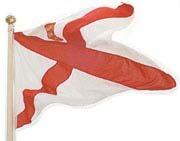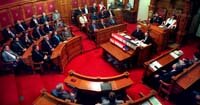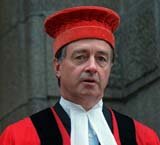|
|
The constitutional government of Jersey
Jersey is constitutionally a dependency of the British Crown.

It is part of the British Isles but not part of the United Kingdom. It governs its own internal affairs and raises its own taxes, but the UK is responsible for the island's defence, overseas representation and international affairs.
Jersey has its own legislative assembly - The States of Jersey - a system of local government through the parishes, and a completely distinct fiscal and legal system and courts of law. Jersey is not represented in the UK Parliament, so acts of Parliament only apply to the island if it is expressly agreed that they should do so.

Jersey's ministerial system of government divides politicians into two camps: those who make decisions (the Executive) and those who monitor and review States policy (Scrutiny).
Ministers have replaced committees at the head of States departments and now have the power to make the decisions that committees would have made on their own.
However, all major changes to policy and new laws will still have to go to the States Chamber for debate and will have to be voted on by the 53 States Members.
The Council of Ministers meet to discuss policy and issues that affect more than one department. The Ministers use a system of 'green’ and 'white’ papers for consultation or policy discussion to find out what Islanders think about issues as the policies are being drafted.
Because the ministerial system concentrates power in fewer hands, the Council of Ministers will be held in check by a set of panels devoted to scrutinising and monitoring States policies who can demand documents and to demand that witnesses appear in front of them.
Their meetings are usually open to the public.
The States currently is made up of the Bailiff, the Lieutenant Governor (who is not allowed to vote), 12 senators, 12 parish constables, 29 deputies, the Dean of Jersey (who also does not have a vote), and as advisers, the Attorney General and the Solicitor General.

The Crown appoints the Bailiff. He is the President of the Assembly and acts as its Speaker. He is also president of the Royal Court. The Bailiff has no political power but has the right to speak in the Assembly for the purpose of ensuring orderly debate. He also has a casting vote, which, by tradition, is used to maintain the status quo and allows the Assembly to reconsider the matter at a later date. The Deputy Bailiff, also appointed by the Crown, acts in the Bailiff's absence.
The Lieutenant Governor is the representative of the Crown in the island and is the commander of the armed forces. He often attends the States but takes no part in debates. However, he can veto States' decisions on matters concerning the special interests of the Crown.
The Attorney General and the Solicitor General are the Law Officers of the Crown and are appointed by the Crown. They have the right to speak but cannot vote. Points of law raised in debate are often referred to them for explanation and clarification.
The Dean is the head of the Anglican Church in Jersey and the chaplain of the Assembly. He has the right to speak on all matters of States' business but cannot vote. By convention, the Dean speaks only on matters that directly affect the Church or moral issues.
This article updated: 2007/01/03 12:18:27
|
|
|
|
|
|
|

|

|

|
|
|

|
| |
| ......Daily Ditons...... |
Ch'est la femme du cordonnyi tch' est la piéthe caûchie.
The cobbler's wife is the worst shod.
|
|
|


